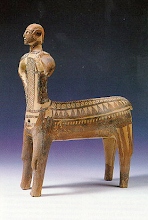.:. Khaire Nymphe Thea .:.
.:. Χαίρε Νύμφη Θεά .:.
an Akathist litany with ancient roots
• Video: .:. Khaire Nymphe Thea .:. Χαίρε Νύμφη Θεά (Vimeo)
• Video: .:. Khaire Nymphe Thea .:. Χαίρε Νύμφη Θεά (YouTube)
• Video: .:. Khaire Nymphe Thea .:. Χαίρε Νύμφη Θεά (MySpace)
• Video: .:. Panaghia Despoina .:. Παναγία Δέσποινα (MetaCafe)
______________________________
This is a visual exploration of the Temple of the Minoan Goddess of Aegina who was known by many names : Aphaia ("the unseen"), Britomartis ("the young woman of honey") and Diktynna ("the lady of the nets").
This is a hymn by Saint Nektarios of Aegina who in his lifetime tried to restore the position of deaconess in the Greek Orthodox Church and who laid the foundations for what became one of the largest sacred buildings in all of Greece.
St. Nektarios was a dedicated scholar and was well versed in the ancient texts and in the liturgy of the early Byzantine Church.
His hymn is almost a reconstruction of the music of the early Eastern Orthodox Church at a time when it was borrowing heavily from the cultural and philosophical traditions of Hellenic and pre-Hellenic Greece.
This Akathist hymn by Saint Nektarios (which has been translated into many languages - including Syrian Arabic) draws heavily on the liturgical traditions and musical forms of the 6th century C.E.
The verb "khaire" (meaning "hail !" in the sense of invocation) is most often "translated" as "rejoice" in the English versions of Akathist hymns.
This is a poor substitute and manages to strip the Greek word of much of its original life and power.
As in the pre-Christian hymns to the Goddess - the refrain "Khaire Nymphe" is repeated after each verse and forms the chorus.
This is reminiscent of the invocation of the Shekinah ("the Holy Spirit") in the traditions of mystical Judaism in which the call "Bo-i Kallah, Shekinah !" ("Come, O Bride, Shekinah !") resounds with deep reverence and love.
In this litany, the Panaghia is invoked by the sacred titles which are part of a silver umbilical cord of continuity that is well-documented from inscriptions stretching back to pre-Hellenic times :
Despoina ("Mistress"),
Nymphe ("Bride"),
Meter ("Mother"),
Kore ("Daughter"),
Kuria ("Lady"),
Anassa ("Queen"),
Basilissa ("Queen"),
Pantanassa ("Queen of All Things"),
Panaghia ("All Holy One" cf. Ariadne / Ariagne ).
One of the most compelling is "Kore Semnae Basilissa" - a ritual title which carries with it echoes of the Mysteries of Rhea, Demeter and Kore in Eleusis, Lykosoura, Mount Ida, Magna Graecia and the islands of the Mediterranean.
Despoina has, in living memory, been one of the names by which the memories of the Goddess are retained in the land, This fact has been well documented since the 19th century - the very time that this inspired litany came into being.
The musical arrangement is timeless, extraordinarily beautiful and evocative.
_________________________________
The many titles which have been encoded in this hieratic aretalogy of the Panaghia are the same as those which were used to invoke the Great Goddess from the pre-Hellenic period onwards.
Before the establishment of formal pantheons the Great Goddess was primarily known by Her sacred titles as is documented in the Linear B tablets and in the earliest inscriptions of Cyprus, Rhodes, Aegina and the Cyclades.
Wanassa (now Anassa) and Basilissa - both meaning "The Queen" are well known titles for the Great Goddess in Minoan Crete and in the islands of the Mediterranean.
Despoina - "The Mistress" is known from inscriptions in Her Pelasgian shrine in the hills of Arcadia and this title remained Hers in the mountain villages of Greece in living memory.
The mysterious traditions of the wonder-working Black icon of Despoina of Tsakonian Elonas (Despina a 'Eona) still manage to transmit a distant ancestral remembrance of the ancient Despoina, daughter of Black Demeter (Μέλαινα Δημήτηρ) of Arcadian Lykosoura (Λυκόσουρα) and Phigalia (Φιγαλεία) to this day.
________________
The chorus of "Khaire Nymphe" is an invocation to "The Bride" and appears in Orphic hymns long before it was consciously appropriated by the Byzantine Church and given new meaning.

St. Nektarios was a scholar and an expert in both Byzantine liturgy and the pre-Christian sacred texts and would have been well aware of the original context when he composed this hymn ...
A pre-Christian version - upon which this hymn could haven been based - may have included the evocative chorus :
.:. Khaire Nymphe .:. Io Nymphe Thea .:.
.:. Χαίρε Νύμφη .:. Ιώ Νύμφη Θεά .:.
__________________
For more information about Despoina in ancient Greece please visit the excellent THEOI.com website :
Despoine on the THEOI reference site

(Despoina Panaghia Parthene and the Parthenon : Byzantine graffito)
(Despoina Panaghia Parthene and the Parthenon : Byzantine graffito)
Tags :
Linear-B : (Wiktionary links)
𐀷𐀙𐀭
wa-na-sa
ανασσα
Queen, divine title
𐀡𐀴𐀛𐀊
po-ti-ni-ja
Πότνια
Lady, divine title
𐀂𐀋𐀩𐀊
i-je-re-ja
ιέρεια
priestess
_____
Despoina Panaghia Despoena Panagia Nymphe Anassa Basilissa Pantanassa Aphaia Britomartis Diktynna Meter Kore Kuria Potnia Aegina Eurynome Elonas Χαίρε Νύμφη Δέσποινα Παναγία Άνασσα Βασίλισσα Παντάνασσα Ἀφαία Βριτόμαρτις Δίκτυννα Μήτηρ Κορή Κυρίᾳ Πότνια Αίγινα Εὐρυνόμη - το ξύλον της ζωής - πηγή αθανασίας - Κορή σεμνή Βασίλισσα - Bριτομάρτεια Καινώ-της-Κρήτης ΜΟΝΗ ΕΛΟΝΑΣ Akathist Agni Parthene Terirem






